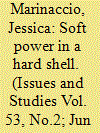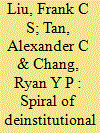| Srl | Item |
| 1 |
ID:
157687


|
|
|
|
|
| Summary/Abstract |
After the Chinese Communist Party’s 18th Party Congress was held in the fall of 2012, frequently asked questions were: Is Xi Jinping able to rein in the Chinese People’s Liberation Army (PLA) and what is the state of Chinese party-military relations? What are the implications of this status for the PLA in China’s Taiwan policy-making? What is the potential impact of Taiwan’s leadership transition on China’s Taiwan policy and on the PLA’s role?
This author argues that through a stick and carrot approach, Xi has become the leader of China, and has been able to rein in the PLA. His proactive and assertive approach in the context of China’s growing capabilities has empowered him to control the discourse of Taiwan policy. In these circumstances, the PLA will continue to be one joint actor within the relevant apparatus executing Taiwan policy without its own agenda. Uncertainty as a result of the ruling party rotation in Taiwan is unlikely to change the PLA’s role.
|
|
|
|
|
|
|
|
|
|
|
|
|
|
|
|
| 2 |
ID:
157688


|
|
|
|
|
| Summary/Abstract |
In 1967, Taiwan began dispatching a portion of its navy, the ROC “Fleet of Friendship,” on goodwill missions to allied nations to strengthen diplomatic friendships. Since that time, one of the major areas of focus for fleet visits has been Taiwan’s allies in the Pacific. In an attempt to move beyond emphasis on the China–Taiwan rivalry in the Pacific, this paper examines firsthand sources to advance three modes of contextualizing the Fleet of Friendship and reveals various layers of historical, pragmatic, and symbolic meaning that exist beyond simple competition with China. First, with specific focus on the performances presented during the fleet’s goodwill visits, this paper contextualizes fleet performances within Taiwan’s unique history, including an extended Martial Law period and tensions regarding the concept of “multiculturalism.” Second, the paper more broadly examines the fleet as a holistic entity on three levels: a hard-power superstructure in which the fleet serves as a reminder of military power; soft-power content in which the activities of the fleet run at cross-purposes with its symbolic military nature; and a hard-power underbelly, in which Taiwanese embassy descriptions of fleet performances and Pacific reporting evince concepts of frenzy, threat, and potential violence. Finally, the paper highlights ulterior motives interlaced within the fleet’s goodwill tours and contextualizes these motives based on other aspects of Taiwan’s diplomacy in the Pacific that demonstrate similar trends. The article evinces the importance of situating analysis of Taiwan’s cultural diplomacy and soft power within a variety of contexts and demonstrates the nuance inherent within Taiwan’s Pacific diplomacy.
|
|
|
|
|
|
|
|
|
|
|
|
|
|
|
|
| 3 |
ID:
157686


|
|
|
|
|
| Summary/Abstract |
As political scientists start applying the complex-system approach to study party politics and as business scholars start to apply communication theories to study deinstitutionalization, we prospect a new possibility to study and explain politics within a political party. This study employs a systematically collected field observation data to evaluate Clemente and Roulet’s (2015) “the spiral of deinstitutionalization” framework. Based on analysis of news events and internal reports within Kuomintang from April 20 to October 17, 2015, we believe that this framework facilitates explanation about how the decision of nominating Hung Hsiu-Chu as the party’s first female presidential candidate was replaced three months before the Election Day. We interpret the whole story and provide details that contribute to enriching the framework for future organizational and political party research.
|
|
|
|
|
|
|
|
|
|
|
|
|
|
|
|
| 4 |
ID:
157685


|
|
|
|
|
| Summary/Abstract |
Our paper draws upon the literature of corporate financial performance and ethical decision-making to examine how corporate past profits and individual characteristics work together to influence corporate philanthropy. We refute the mediation model in the literature and propose the moderation model instead. Our analysis shows that firms’ prior financial performance is a critical determinant of corporate giving. Furthermore, being a male entrepreneur strengthens the positive relationship between firms’ past profits and corporate giving, whereas education weakens such relationship. Our study advances the research of corporate philanthropy and ethical decision-making as well.
|
|
|
|
|
|
|
|
|
|
|
|
|
|
|
|